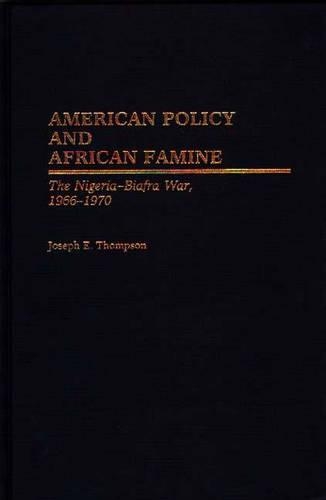
American Policy and African Famine: The Nigeria-Biafra War, 1966-1970
(Hardback)
Publishing Details
American Policy and African Famine: The Nigeria-Biafra War, 1966-1970
By (Author) Joseph E. Thompson
Bloomsbury Publishing PLC
Praeger Publishers Inc
17th April 1990
United States
Classifications
Tertiary Education
Non Fiction
International relations
African history
History of the Americas
966.9052
Physical Properties
Hardback
200
Description
In the summer of 1968 as killing and starvation escalated in Biafra in a war that used famine as a weapon, the West African conflict attracted media attention and U.S. officials felt strong domestic pressure to expand American involvement in Nigeria's civil war. The official U.S. policy of neutrality eventually encompassed an activist policy of humanitarian assistance for Biafra. Joseph E. Thompson's comprehensive study describes the events and decisions that led to increased American involvement in the Nigeria/Biafra War of 1966-1970--a complex period during which the U.S. was attempting to extricate itself from involvement in Vietnam. Professor Thompson provides a thorough examination of both the domestic and international pressures that resulted in dichotomous U.S. policies and analyzes the reasons for their longevity. The volume's contribution to an understanding of U.S. policy formation is important because the U.S. is the major respondent to international famine, one of the most serious contemporary problems of the developing world. An introductory essay, surveys the Nigerian political system and military coups of 1966 and details initial U.S. responses to these violent changes. An Epilogue scrutinizes the increased U.S. public and private relief for Biafra and compares it to the present African famine situation. The first three chapters consider the contrasting perceptions of Nigeria transmitted to Washington, detail both internal and external disruptions caused by Nigerian military activity, and review attempts to resolve the fratricidal conflict. Evolving U.S. policy, the role of church relief groups on governmental, technological and logistical obstacles, and bureaucratic roadblocks inherent in the structures of both government and humanitarian groups are explored in the next three chapters. Chapter 7 zeroes in on U.S. diplomatic efforts to skirt humanitarian issues, and Chapter 8 assesses U.S. difficulties in following a course of political non-involvement in Nigeria while supplying humanitarian relief to Biafra. Fifteen valuable tables and figures and 5 maps complete this distinguished contribution to African Studies literature.
Reviews
This arresting monograph explores the dichotomous--and contradictory--policies of the US government in relation to 1967-70 Nigerian civil war, policies which, on the one hand, dictated support for the Nigerian federal government's effort to keep the country united, and on the other, pushed the US, through an expanding humanitarian aid effort to the Biafrans, into becoming the secessionist state's principal foreign friend. US policymakers could never quite reconcile the contradiction, and the problem was resolved only by the collapse of the Biafrans in January 1970. Part of the problem lay in Washington's failure to read the all-too-visible signs of impending national political breakdown in Nigeria (the Embassy in Lagos had become a "client" of the regime in power, disregarding the more realistic assessments of its consulates in Ibadan and Enugu). The story, effectively told and well documented, is worth close reading because of the lesson it teaches about the continuing inability of the US to deal with foreign policy problems when they have both a realpolitik and a humanitarian face. Complements John Stremlau's excellent. The International Politics of the Nigerian Civil War, 1967-1970 (CH, Apr'78).-Choice
"This arresting monograph explores the dichotomous--and contradictory--policies of the US government in relation to 1967-70 Nigerian civil war, policies which, on the one hand, dictated support for the Nigerian federal government's effort to keep the country united, and on the other, pushed the US, through an expanding humanitarian aid effort to the Biafrans, into becoming the secessionist state's principal foreign friend. US policymakers could never quite reconcile the contradiction, and the problem was resolved only by the collapse of the Biafrans in January 1970. Part of the problem lay in Washington's failure to read the all-too-visible signs of impending national political breakdown in Nigeria (the Embassy in Lagos had become a "client" of the regime in power, disregarding the more realistic assessments of its consulates in Ibadan and Enugu). The story, effectively told and well documented, is worth close reading because of the lesson it teaches about the continuing inability of the US to deal with foreign policy problems when they have both a realpolitik and a humanitarian face. Complements John Stremlau's excellent. The International Politics of the Nigerian Civil War, 1967-1970 (CH, Apr'78)."-Choice
Author Bio
JOSEPH E. THOMPSON is Associate Professor of Political Science at Villanova University. He has been a contributor to many books and journal articles, among them, Northern Ireland: Living with the Crisis (Praeger 1983), and Irish American Voluntary Organizations (Greenwood Press). He was also involved in a research trip to Nigeria in 1979 and is a former Scholar-Diplomat in the State Department African Program on the Nigeria Desk, 1975 and 1977.
